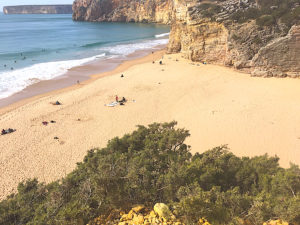
The sun is warm on my shoulders. The salt is starting to pinch the skin at the corners of my eyes as it dries. A small white cup of coffee with a tiny round handle sits on the table. The steam from the cup dances in the low angle of the midmorning sun. The croissant on my plate is surrounded by shed bits of its flaky, golden skin. More flakes crackle and fall with each bite. I always gather them up at the end between pinched fingers and eat them. Aside from the toasted ends, they’re my favorite part.
A figure walks into the café with an ease that comes only from familiarity. “I know this space and I feel at home here,” says his body language. The movement, the casual presence, the worn but neat clothing feel familiar to me. I feel like I know this person. I nearly reach out for a handshake and say hi. Then I remember I am 3,000 miles from home, in a small town in the south of Portugal, and I don’t know anyone here. I smile and give a nod. Something is recognized, and the nod and smile are returned.
There is a commonality in every surf town I have ever been to. They are also all unique and different. They all have a feel and color and flavor of their own, but there is something familiar in them all. The leaves on trees are different. The buildings have angles and colors that are new. The coast has its own geologic history, revealing itself in layers and shapes new to my eyes. But something is known.
The characters who walk the sidewalks of these towns have a style and gait that I know. It is the language spoken with hands and body that feels familiar. It is the clothing that is chosen more for comfort and ease than to impress. It is the hair styled by salt water and sweatshirts being pulled over heads. It is an unspoken shared love of something fleeting and ethereal. It is a feeling of connection to strangers that serves as common ground. It gives new places and people a feeling of home.
The morning I walked into the café the man behind the counter was someone I had never before seen. But his smile was welcoming. When we walked in, he could tell we had come from an early morning surf. The comfortable exhaustion in our shoulders and satisfied smiles on our faces told of a morning in the water. This was clear to the man, because he knew the feeling himself. No words were exchanged on the subject, only a smile of appreciation for the feeling. He was a surfer. This was his place. He had built this space to support a life style, to have a schedule that could bend and flex with the waves. Surfing was important enough to him that he shaped his life to work around his need to surf. This place was closed when the waves were good.
This café, with pictures of local waves on the walls printed on giant canvases and homemade wooden tables and benches, was a meeting point. It was where people would collect to talk story and laugh. Every place has one. Its characters were different, unknown to me, but somehow so familiar.
On the front steps of the café a bunch of salty people sat and talked. They were blond kids, young travelers, and crusty locals. In their hands were skateboards and egg sandwiches, coffees and beers. They spoke Dutch and Portuguese, Spanish and French. No matter the language, the topic of discussion was clear. The tide and the swell direction and the wind are the same in any language. They told stories of waves surfed that morning and of their hopes for what the waves would do that afternoon. They related to each other in the same way my group of friends does at the top of the dune after a morning in the water.
As we left the café, the leaves on the trees looked a little less foreign. The walls and doorways of the houses along the street looked a little more welcoming. The owner of the café gave us a smile and a nod as we moved through the small crowd, and suddenly 3,000 miles didn’t feel so far.



